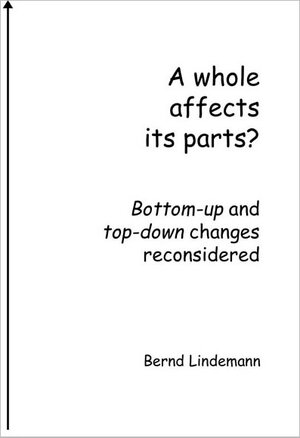
×
![Buchcover ISBN 9783938165362]()
Can a whole change its components top-down? With a whole constituted of components (or parts), top-down changes should originate at the whole (assigned to system level n) and affect the components at the level below (level n-1, “the bottom”). Top-down experiments search for such changes in natural mechanisms. They require (a) primary interaction of a peer object with the mechanism as a whole, which is (b) followed or accompanied by a change among its components. It is often claimed that such experiments or observations (of swarm behaviour, for instance) have shown that a whole can indeed change the properties of its parts. However, all the top-down experiments and observations considered here turn out to have alternative explanations of the bottom-bottom plus bottom-up type. To account for this disconcerting result, I argue that a constituted whole necessarily depends in existence and all properties on its components and their relations and only on them. This restriction implies that, contrary to expectation, a constituted whole (a) cannot be subjected to a not-constitutive top-top change. Nor can it then (b) effect a top-down inverse-constitutive change, as the constitutive relation of mechanisms is shown to be asymmetric (bottom-up only). (Proof included.) Nor can the whole (c) effect a top-down causal change, as a whole cannot encounter the components, which it inseparably contains, for interlevel interaction.
For these reasons mutual manipulability of whole and components of mechanisms, which the literature claimed repeatedly, is not possible, top-down changes directed from whole to components remain elusive in theory and practice. Related issues, foremost the nature of constituted wholes and the nature of system levels, are discussed.
For these reasons mutual manipulability of whole and components of mechanisms, which the literature claimed repeatedly, is not possible, top-down changes directed from whole to components remain elusive in theory and practice. Related issues, foremost the nature of constituted wholes and the nature of system levels, are discussed.


